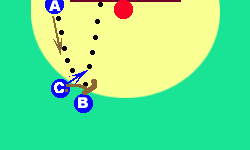 |
1.Two attackers and a goalkeeper. The player (A) push the ball towards the player
(B) who is upright.The player (C) stops the ball and
shots to the goal. |
The shooter: The ball is stopped in the shooting
circle. This shooting can be direct or a scoop . (see rules ).
The passor: its two supports are on a straight line
directed towards the shooter. The point of the left foot is directed
towards the shooter. At the time of the pass all the weight of
the body is thorough in the direction of the shooter. |
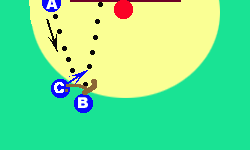 |
2. Three attackers and a goalkeeper. The passor (A)
passes the ball to the receiver (B) who stops the
ball with the stick. This player is squatted on the ground
with three supports (see rules). After the stop he made a variation
to allows at the player (C) shooting or scooping. |
-To rather require at the beginning the precision of the pass
to (B) than the power. |
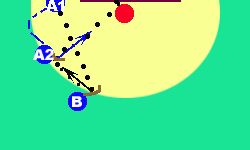 |
3. Two attackers and a goalkeeper. The passor (A)
sending the ball with (B) who stops it During the
displacement of the ball, the player (A) goes to place
himself halfway A-B. The receiver gives him the ball and
after stop it is (A) who shots towards the goal. |
-To require the precision of the pass and the block.
-To seek the best placement in (A2) to shot before
the intervention of the goalkeeper.It was is called the timing.
. |
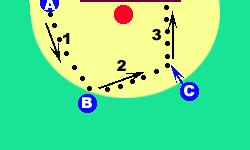 |
4.Three attackers and a goalkeeper. The player
(A) passes to (B) who blocks the ball. The, this one passes
to (C)who enters running in the shooting circle and shots.
.
Variations:The player (A) approach (B)
as in the exercise 3, so that the receiver (B)
can pass either to (A) or to (C).
- As for the previously exercise there are three attackers
and a goalkeeper. In this case it is the player(C) who
gives again to (A). |
-To search the coordination of displacements
(timing).
-To require the precision of the pass and of the blocks. |
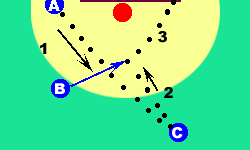 |
5.Three attackers and a goalkeeper.The player (A)
passes the ball to (C) who is out of the shooting circle.
The ball is stopped by (C) who sends it in the shooting
circle. the player (B) who is entered there while running shots
in flight. |
-The shot in flight must not to be stroked but pushed. |
|
|
6. The disposition of the players.
The places of the attackers and defenders of the two teams
are reproduced on the first diagram.
After the departure of the ball, the red
n°1 will make a screen on
the blue
n° 1 .
The red n°2 take the place of the goalkeeper who is gone
near the player blue n°3 and the blue
n°5 . The players red n°4 and red n°5 will
mark the players blue n°4
blue and blue
n°5 . |
-At the beginning the defenders are
on the back line. They can to enter in the shooting circle only
after the ball has been pushed by the blue
n° 1 and not after the
whistle of the referee. |


